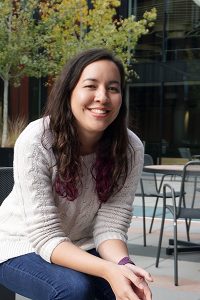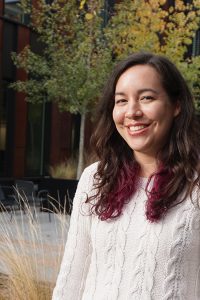 Rice University computer science alumna Elaine Sulc loves building data visualization tools for Tableau customers. “I’ve used our tools to connect to my Fitbit data in order to visualize and monitor my exercise patterns,” she said. “I can even connect to my own financial data, and discover insights. Coworkers use Tableau to track the progress of a feature or bug. Customers have all different kinds of data and we help them visualize and analyze it.”
Rice University computer science alumna Elaine Sulc loves building data visualization tools for Tableau customers. “I’ve used our tools to connect to my Fitbit data in order to visualize and monitor my exercise patterns,” she said. “I can even connect to my own financial data, and discover insights. Coworkers use Tableau to track the progress of a feature or bug. Customers have all different kinds of data and we help them visualize and analyze it.”
Sulc had completed two summer internships with a global consulting corporation before exploring the environment at Tableau, a smaller, software-focused company. Although she learned a lot from her previous internships, she felt removed from the company’s actual products.
“Instead of working on internal software for employees in another area of the company, I’m working on a product I love and can tell that other people enjoy too,” said Sulc.
Tableau specializes in helping their customers interpret their own data through visualization. They provide business intelligence to guide and support business strategy decisions.
Just as Sulc can visualize trends in her activity or expenditures, Tableau customers with varying levels of statistical, analytical, or programming skills can easily see and understand their own data. Providing tools for anyone to use in making and improving their own decisions is a mission that resonated with Sulc.
“Everyone on my team has had the opportunity to work in different areas,” she said, “from rewriting the user interface, to working on critical features like autosave, to contributing to product vision. Now we’re making it easier to share code between desktop and web products.”
Her favorite part of her job is beginning work on a new feature. “We work together to figure out various paths, identify obstacles, and determine the best way to solve the problem. It’s always exciting when all the pieces fall into place. The process is so much more collaborative than students expect when we’re sitting in our computer science classes.”
After her first year at Tableau, Sulc mentored a team of interns. She enjoyed leading the interns, managing a team, and determining how to divide up work. Sulc learned how to give feedback and communicate effectively.
Sulc didn’t always plan on going into computer science. While attending her Nashville, TN high school, she signed up for a beta program of an online computer science course. The course taught students how to program in Java, including projects like drawing a snowman. Before this, Sulc had been planning on majoring in history or math, but was intrigued by the possibilities of computer science.
“I connected with the math-related parts of computer science and the ability to create something from scratch. And I liked that I could see the results of my work instantly.”
Although her parents worked in technology careers, both wanted Sulc and her brother to figure out their own interests. Sulc and her brother did follow their own paths, coincidentally discovering a passion for technology along the way.
“At Rice, my first exposure to CS was in COMP 140 with Professor Subramanian,” said Sulc. “It was awesome and definitely reinforced my interest in programming. Then there were classes that were more difficult and made me doubt if CS was right for me.
“I persevered by remembering how much I enjoyed the material in those other classes —courses that catered to my strengths—and I tried to view the challenging areas as places where I needed to improve. The fact that there were still aspects of CS I enjoyed is what kept me focused.”
She encourages current and prospective CS students to take classes in the areas they enjoy, even if the courses are not CS-related. Sulc decided early to pursue a bachelor of arts in CS because she wanted to study abroad, and she preferred to take subjects there that would not necessarily meet requirements for her major.
 “I went to Rome and took a whole semester of non-CS courses: classical studies, ancient history, art history, and Italian. I did that the spring of my sophomore year and found it valuable to learn about topics outside of my major.”
“I went to Rome and took a whole semester of non-CS courses: classical studies, ancient history, art history, and Italian. I did that the spring of my sophomore year and found it valuable to learn about topics outside of my major.”
She recommends every student try things that broaden their minds and life experiences, even if it means delaying CS courses for a semester.
“Don’t hesitate to find your own path. You’ll find it easier to collaborate with others if you have a wide range of interactions with different people and cultures. Being able to talk about something besides CS helps expand your network.”
By her third internship, when she spent a summer in Seattle at Tableau, Sulc had identified her passion.
“As an intern, I worked on a small calculation editor with a team. At the end of the summer, all the interns were invited to the annual Tableau conference, where they demoed the projects we worked on to thousands of people.
“At the end of our presentations, we could hear the cheers from customers. Tableau’s people and culture and the impact our work can have — those are all the reasons I came back. I got the return offer on the last day of my internship and accepted it immediately. I wanted to stay with what I already knew I loved.”
Elaine Sulc earned her B.A. in Computer Science in 2015.
